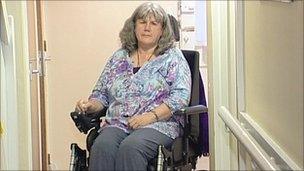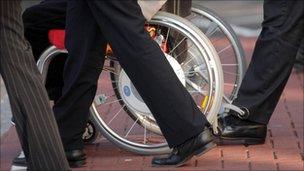Spending review: Disabled people dread impact of cuts
- Published

Anne Novis says she is 'terrified' for her future
Marcus Bradford, 43, left paralysed on his right side by a stroke, says his social life outside his care home will all but end.
Paul Corbett, 56, who is waiting for heart surgery, fears he could lose his home.
Anne Novis, 54, in constant pain from a spinal injury, worries she could lose some of the funding for the carers who wash and dress her.
They are among hundreds of thousands of long-term sick and disabled people likely to feel the effects of Wednesday's spending review, announced as the government tries to tackle the national deficit.
Benefit reductions, cuts to local authority budgets and continuing reforms of the old incapacity benefits system have left many facing uncertainty.
'Sometimes suicidal'
Marcus relies on £49.50 a week - the "mobility component" of the Disability Living Allowance - to travel beyond the vicinity of his Essex care home.

Marcus Bradford worries he would not be able to visit his mother if his mobility allowance was cut
But from October 2012, this will be axed for all care home residents.
He says without it, he will have just £18 a week left over from the benefits that pay for the home, and that barely covers his toiletries and clothing.
He says he won't be able to afford to visit his ailing 75-year-old mother 30 miles away, or to travel eight miles into nearby Clacton-on-Sea.
Some days, he already feels deeply depressed - "sometimes suicidal" - about his condition.
"We won't be able to do anything, we're going to be resigned to staying in the care home, 365 days a year," he says.
The government says care homes should provide for such visits, and that people in residential care will get the financial help they need.
'Savings gone'
The spending review also included changes to the Employment and Support Allowance, brought in by Labour to replace incapacity benefit, for people too ill or disabled to work.
A new qualifying test has been introduced. Unless claimants are severely disabled or terminally ill, they are expected to try, with support, to develop their capacity for "work-related activity" and start to look for jobs.
But on Wednesday it was announced that, from April 2012, these claimants will be given a year to find work - after which only the poorest will continue to receive ESA.
Anyone who has not found work, whose partner earns more than £90 a week, or who has more than £16,000 assets, will lose the benefit.
For Paul Corbett, who had to give up his job as a coach driver when he developed heart problems, this would mean losing about £300 a month, though it can be more for some claimants.
Paul's wife is paid £6.58 an hour for working at McDonalds near their home in Talbot Green, Rhondda Cynon Taff, which would push them over the threshold.
After four failed angioplasty operations, he hopes another attempt - or open heart surgery - will eventually get him back to work.
But if he has to wait too long, he fears his ESA will be taken away.
Paul may still be eligible for other benefits, but he has already used up all his savings.
"It could mean I'll have to give the house up - and then I'll have to ask for social housing, which is basically defeating what the government wants to do!"
'Human tragedy'
There are 200,000 people on ESA, classed in the "work-related activity group", that the changes are likely to affect.
But another 1.5 million people on incapacity benefit will be re-assessed and transferred to the new system over the next three years.
Work and Pensions Secretary Iain Duncan Smith has said the reforms are "not about forcing sick and disabled people who cannot work into employment".
He believes nearly one in four people on incapacity benefits are actually fit for work.
Mr Duncan Smith says he wants to end the "human tragedy" of the "lost potential of so many people who have been dumped to languish at the bottom end of society".
But Anne Novis, a former community worker who has fostered 23 children, says she'll feel "sick to the stomach" when the letter arrives inviting her to an assessment of her incapacity benefit status.
She knows of people with disabilities more severe than her spinal condition, who have been considered able to try to seek work.
While she is highly articulate, and can perform tasks like sending e-mails, she says she could do no more than spend an hour or two per day working online or on the phone, from her bed or reclining chair.
"But that won't earn enough to live on," she says.
"I've been like this for 20 years, my condition is deteriorating, I'm not going to be able to get a job… it's like la la land."

The government has pledged to "protect the vulnerable"
Disability campaigners say the new tests are flawed, pointing out that 40% of appeals against decisions are upheld.
But the Department for Work and Pensions says it is "unfair to suggest the system isn't working" and points out that only 5% of all cases are overturned, although it has commissioned a review of the test.
Anne also fears a change in her incapacity benefit status would affect other disability benefits which are tied to it.
One of these funds half of the 70 hours a week of personal care on which she relies.
"I am personally terrified for myself," she says. "I feel that I won't have a life, that I would just be a burden on my family."
Social care 'crisis'
She also fears for the local authority funding that covers the rest of her care.
David Congdon, head of campaigns and policy at the learning disability charity Mencap, says there is already an "enormous funding crisis" in social care as the population ages.
And local authorities now face 26% cuts to their budgets over the next four years.
The Treasury has transferred an extra £2bn from the health budget, but Mr Congdon says this "won't really bridge the gap".
The government promises to "protect the vulnerable". But many disabled people have serious doubts.